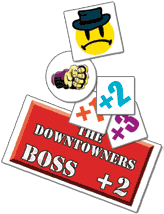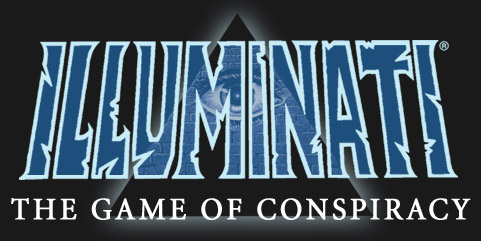by Steve Jackson
(A shorter version of this article appears in the rulebook itself.)
Crime Lords was developed from Illuminati, which I originally wrote in 1982. (Time flies!) If you've played Illuminati, then Crime Lords won't be hard to pick up. Most of the basic mechanics are similar. But there are a lot of differences . . . some dictated by the difference between the city streets and the "world of conspiracies," and some just because. And no, the two games cannot be combined. I want to do more Illuminati supplements, but Crime Lords has always been meant to be a stand-alone game.
Power Structures
The basic idea of "building subordinates around a center boss" is the same. But in Crime Lords, any Crook can gain power and become the Boss. There are no "special victory conditions" for each Mob . . . they all want exactly the same thing, which is to control a whole lot of Rackets. But between the individual abilities of each Mob, and the fact that any Crook can wind up at the head of any Mob, there are a LOT of different ways to achieve that goal.
The card layouts work differently, too. In Illuminati, you can lay Groups either horizontally or vertically, and sometimes they end up upside-down relative to the player. People seem to accept that . . . but it does kind of bug me. So in this game, all Crooks are laid out vertically.
The rules for control are different, too. Illuminati has "control arrows" that regulate how the cards can be laid. Crime Lords has an implicit "control arrow" on each side of every Crook. But when you add a new Crook, he must be "below" somebody of higher Power. This can mean that you're unable to recruit a very desirable Crook . . . because he's so powerful that he won't be willing to report to any of the lowly scum who have an open side. Very different from Illuminati, in which, once you control a Group, you can put it where you like, and the Multinational Oil Companies might wind up controlled by the Health Food Stores!
And the auction process that starts the game is completely unlike anything in Illuminati. We tried a lot of different opening mechanics. This one was a wild idea that worked surprisingly well. The auction is a mini-game of its own, and it's turned out to be fun. (One of the optional rules at the end of this article is an earlier version of the auction.)

Rackets and G-Notes
In Illuminati, each Group has its own treasury, and a big part of the strategy is in deciding how to place your money. In Crime Lords, each player has a single treasury. But money is very important in this game . . . bad cash flow can take a Mob down even if nobody attacks it. In Illuminati, almost every Group, except a few no-income deadbeats and the cash-sucking Post Office, brings in money. The bigger your Power Structure is, the richer you get. But in Crime Lords, your Power Structure is composed of greedy Crooks . . . they all want money (except for poor stupid Gimpy), and the more powerful they are, they more they want. Maintaining a big Mob is expensive.
To get this money, you have to take over Rackets. Here, I borrowed a mechanic from the "resource" cards in INWO, the trading-card version of Illuminati. Rackets are not part of the Power Structure; they're kept separate. Nevertheless, they do interact with each other and with the Crooks you control. The Rackets you already have will determine which new Rackets are easiest to control, and some combinations of Rackets give you extra money. Likewise, many Crooks give bonuses to control or protect some Rackets, or make them worth more Income. And some Crooks give an extra bonus if you make them your mob Boss.
The "bidding" mechanic by which Illuminati players spend money for and against an attack, staring each other down, has been replaced by a faster "showdown" mechanic. It's still a game of threat and bluff, but the flavor is different.
Game Balance

In Illuminati, you start with only a single Illuminati card, but you can't be eliminated in the first few turns. In Crime Lords, you'll have several Crooks and/or Rackets on your first turn – depending on how you did in the auction! – but you can be wiped out quickly if you don't solidify your position.
Card "actions" are regulated by Action Tokens, which is the other mechanic I recycled from INWO. You can take as many actions as you like, as long as you have tokens. A big difference from INWO, though . . . In that game, you replace your cards' tokens at the beginning of your turn. In Crime Lords, you retoken at the end of your turn. This has some interesting effects on play; try it the other way, if you like, and see!

Tokening Up
Crime Lords has three different kinds of tokens: money like Illuminati, Action Tokens like INWO, and a new one . . . "Unhappy" markers. A Crook gets one of these when things don't go to his liking (for instance, if somone close to him in the organization gets hit, or if he doesn't get paid enough.) Three Unhappy markers and the Crook goes uncontrolled (if he wasn't paid) or leaves town (if something dangerous happened). Fortunately, there are ways to make your Crooks happy again . . .
The Action Tokens are die-cut pieces showing a fist. They work just like the ones in INWO, though you retoken at the end of your turn.
And money is money. You'll notice the money tokens are the same as those in Illuminati. This honestly wasn't laziness; it would have been easy to design new ones. But I thought some players might like to have one big pile of money to use with both games.
More Power To You
There are also markers with +1, +2, and +3 on them. These are used to show increases in power (gained when a Crook kills a rival) or in the income of controlled Rackets.
Have fun, and may you not sleep with the fishes . . .
Bidding for Crooks
This is an early version of the auction mechanism in Crime Lords, and is presented here as an optional rule. Doing it this way takes longer than our final system. Its advantages are that it lets you plan ahead, so it's less likely that one player will get a dramatically weaker starting setup. (Keeping the starting Mobs balanced is more important in two player games.) The disadvantage is that it can take a lot longer than the way we finally decided to do it, both because the auction itself takes longer, and because when you start with no Rackets at all, the first few turns are pure building-up.

Each player takes 20 Gs of cash. This is your "bidding money," and any left over at the end of this process is lost, so spend it wisely. Deal Crooks out of the deck (discarding other cards) until you have four times as many Crook cards as there are players. Arrange these Crooks where everyone can see them.
The players now bid for their starting gang members. Roll dice to see who goes first. That player picks one Crook to be "auctioned off." You do not have to bid on the Crook you pick to be auctioned. Bidding goes counterclockwise.
If nobody bids on a Crook, he goes back into the pool on the table. Otherwise, the winning bidder gets that Crook.
Continue until there are only as many Crooks left as there are players. (So, for instance, four players would start with 16 Crooks, and continue until only four were left). Discard these; the bidding is over. Now reshuffle all remaining cards, except the unused Mob cards, to form the draw deck for the game.
Strategy note: When you bid for Crooks, look for special abilities that work well with your Mob ability, even on low-powered Crooks. After all, low Power means they're cheap to pay. You need at least one powerful Crook to be your Boss (with a Power of at least 4 . . . and a Power of 5 or 6 is better, unless you see a special ability you really like).
When you use this starting setup, you should give each Mob an extra 10 or 20 Gs to start with, as they'll have no income at all on the first turn and not much on the next couple. Or you can include rackets in the intial auction. Twice as many rackets as there are players is a good number, and give everyone 25 Gs to bid with. Stop when there are as many cards left as there are players – whether the leftover cards are Crooks or Rackets.
Cheating

| "Dis is a crime game, right? So why can't we cheat, huh?" |
These rules were based on the cheating rules for Illuminati. They were taken out mostly for space and layout reasons. After all, said we, we can always put them online . . .
If players agree to have a Cheating Game, most forms of cheating are permitted. Exceptions:
1. You may not tip over the table or disarrange the Mob organizations.
2. You may not bring in counterfeit money, or money from other sets. Nor may you bring in Special cards from other sets.
3. You may not cheat on the amount of money drawn from the bank during setup or the Income phase, or on the amount you pay your Crooks. (Making every player watch every token drawn or paid out would slow things down too much.)

Anything else goes. Anyone caught in the act must undo that cheat. There is no other penalty.
Suggested methods for cheating include:
1. Accidentally misread the dice.
2. Steal from the bank (other than during your Income phase).
3. Lie about the amount of Power or Resistance your Crooks have.
4. Stack the deck, or peek ahead.
5. If someone leaves the table, anything goes!
We recommend you play the Cheating Game only with very good friends, or with people you will never see again.












